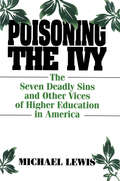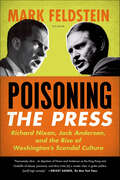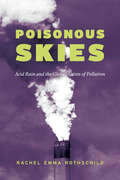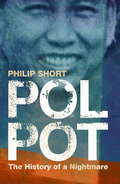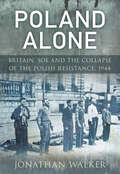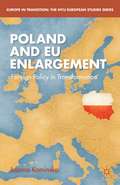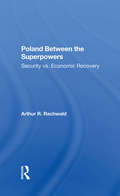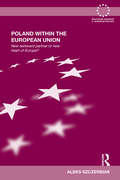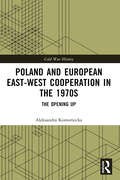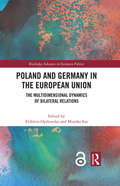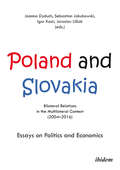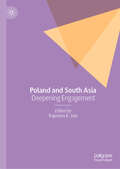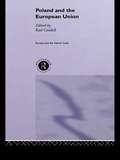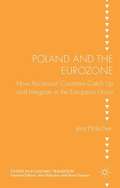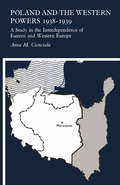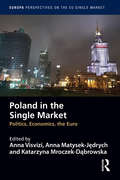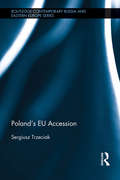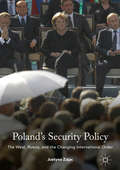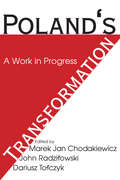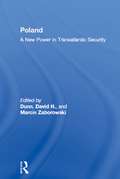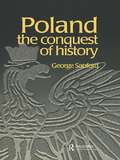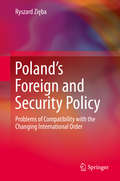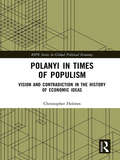- Table View
- List View
Poisoning the Ivy: The Seven Deadly Sins and Other Vices of Higher Education in America
by Michael Lewis"This is a dirty book about higher education." So begins Michael Lewis's provocative new book, one that calls into question the conventional wisdom and about the excellence of American higher education. Lewis argues that teaching and research on America's campuses are plagued by mis- and malfeasance. He further argues that these troubles are the paradoxical implications of professorial self-conceptions. The academic claim of moral and ethical specialness, according to Lewis, unexpectedly creates an environment where hack work or even no work at all is tolerated and in some cases actually rewarded. Through his chapters on "The Seven Pedagogical Sins" and "The Bad Joke of Scholarship, " the author traces the trajectory of the effects of collective denial on the quality of education in America. In his final chapter, Lewis offers a series of reforms intended to reverse faculty permissiveness.
Poisoning the Press: Richard Nixon, Jack Anderson, and the Rise of Washington's Scandal Culture
by Mark FeldsteinIt is March 1972, and the Nixon White House wants Jack Anderson dead. The syndicated columnist Jack Anderson, the most famous and feared investigative reporter in the nation, has exposed yet another of the President's dirty secrets. Nixon's operatives are ordered to "stop Anderson at all costs"—permanently. Across the street from the White House, they huddle in a hotel basement to conspire. Should they try "Aspirin Roulette" and break into Anderson's home to plant a poisoned pill in one of his medicine bottles? Could they smear LSD on the journalist's steering wheel, so that he would absorb it through his skin, lose control of his car, and crash? Or stage a routine-looking mugging, making Anderson appear to be one more fatal victim of Washington's notorious street crime?Poisoning the Press: Richard Nixon, Jack Anderson, and the Rise of Washington's Scandal Culture recounts not only the disturbing story of an unprecedented White House conspiracy to assassinate a journalist, but also the larger tale of the bitter quarter-century battle between the postwar era's most embattled politician and its most reviled newsman. The struggle between Nixon and Anderson included bribery, blackmail, forgery, spying, and burglary as well as the White House murder plot. Their vendetta symbolized and accelerated the growing conflict between the government and the press, a clash that would long outlive both men.Mark Feldstein traces the arc of this confrontation between a vindictive president and a flamboyant, crusading muckraker who rifled through garbage and swiped classified papers in pursuit of his prey—stoking the paranoia in Nixon that would ultimately lead to his ruin. The White House plot to poison Anderson, Feldstein argues, is a metaphor for the poisoned political atmosphere that would follow, and the toxic sensationalism that contaminates contemporary media discourse. Melding history and biography, Poisoning the Press unearths significant new information from more than two hundred interviews and thousands of declassified documents and tapes. This is a chronicle of political intrigue and the true price of power for politicians and journalists alike. The result—Washington's modern scandal culture—was Richard Nixon's ultimate revenge.
Poisonous Pandas: Chinese Cigarette Manufacturing in Critical Historical Perspectives (Studies of the Walter H. Shorenstein Asia-Pacific Research Center)
by Matthew Kohrman, Gan Quan, Liu Wennan, and Robert N. ProctorPlease note that this is a Chinese language edition. A favorite icon for cigarette manufacturers across China since the mid-twentieth century has been the panda, with factories from Shanghai to Sichuan using cuddly cliché to market tobacco products. The proliferation of panda-branded cigarettes coincides with profound, yet poorly appreciated, shifts in the worldwide tobacco trade. Over the last fifty years, transnational tobacco companies and their allies have fueled a tripling of the world's annual consumption of cigarettes. At the forefront is the China National Tobacco Corporation, now producing forty percent of cigarettes sold globally. What's enabled the manufacturing of cigarettes in China to flourish since the time of Mao and to prosper even amidst public health condemnation of smoking? In Poisonous Pandas, an interdisciplinary group of scholars comes together to tell that story. They offer novel portraits of people within the Chinese polity—government leaders, scientists, tax officials, artists, museum curators, and soldiers—who have experimentally revamped the country's pre-Communist cigarette supply chain and fitfully expanded its political, economic, and cultural influence. These portraits cut against the grain of what contemporary tobacco-control experts typically study, opening a vital new window on tobacco—the single largest cause of preventable death worldwide today.
Poisonous Skies: Acid Rain and the Globalization of Pollution
by Rachel Emma RothschildThe climate change reckoning looms. As scientists try to discern what the Earth’s changing weather patterns mean for our future, Rachel Rothschild seeks to understand the current scientific and political debates surrounding the environment through the history of another global environmental threat: acid rain. The identification of acid rain in the 1960s changed scientific and popular understanding of fossil fuel pollution’s potential to cause regional—and even global—environmental harms. It showed scientists that the problem of fossil fuel pollution was one that crossed borders—it could travel across vast stretches of the earth’s atmosphere to impact ecosystems around the world. This unprecedented transnational reach prompted governments, for the first time, to confront the need to cooperate on pollution policies, transforming environmental science and diplomacy. Studies of acid rain and other pollutants brought about a reimagining of how to investigate the natural world as a complete entity, and the responses of policy makers, scientists, and the public set the stage for how societies have approached other prominent environmental dangers on a global scale, most notably climate change. Grounded in archival research spanning eight countries and five languages, as well as interviews with leading scientists from both government and industry, Poisonous Skies is the first book to examine the history of acid rain in an international context. By delving deep into our environmental past, Rothschild hopes to inform its future, showing us how much is at stake for the natural world as well as what we risk—and have already risked—by not acting.
Pol Pot: The History of a Nightmare
by Philip ShortPol Pot was an idealistic, reclusive figure with great charisma and personal charm. He initiated a revolution whose radical egalitarianism exceeded any other in history. But in the process, Cambodia desended into madness and his name became a byword for oppression.In the three-and-a-half years of his rule, more than a million people, a fifth of Cambodia's population, were executed or died from hunger and disease. A supposedly gentle, carefree land of slumbering temples and smiling peasants became a concentration camp of the mind, a slave state in which absolute obedience was enforced on the 'killing fields'. Why did it happen? How did an idealistic dream of justice and prosperity mutate into one of humanity's worst nightmares? Philip Short, the biographer of Mao, has spent four years travelling the length of Cambodia, interviewing surviving leaders of Pol Pot's Khmer Rouge movement and sifting through previously closed archives. Here, the former Khmer Rouge Head of State, Pol's brother-in-law and scores of lesser figures speak for the first time at length about their beliefs and motives.
Pol Pot: The History of a Nightmare
by Philip ShortPol Pot was an idealistic, reclusive figure with great charisma and personal charm. He initiated a revolution whose radical egalitarianism exceeded any other in history. But in the process, Cambodia desended into madness and his name became a byword for oppression.In the three-and-a-half years of his rule, more than a million people, a fifth of Cambodia's population, were executed or died from hunger and disease. A supposedly gentle, carefree land of slumbering temples and smiling peasants became a concentration camp of the mind, a slave state in which absolute obedience was enforced on the 'killing fields'. Why did it happen? How did an idealistic dream of justice and prosperity mutate into one of humanity's worst nightmares? Philip Short, the biographer of Mao, has spent four years travelling the length of Cambodia, interviewing surviving leaders of Pol Pot's Khmer Rouge movement and sifting through previously closed archives. Here, the former Khmer Rouge Head of State, Pol's brother-in-law and scores of lesser figures speak for the first time at length about their beliefs and motives.
Poland Alone: Britain, SOE and the Collapse of the Polish Resistance, 1944
by Jonathan WalkerPoland was the 'tripwire' that brought Britain into the Second World War but neither Britain, nor Poland's older ally, France, had the material means to prevent Poland being overrun. The broadcast, 'Poland is no longer alone' had a distinctly hollow ring. During the next four years the Polish Government in exile and armed forces made a significant contribution to the Allied war effort; in return the Polish Home Army received a paltry 600 tons of supplies. Poland Alone focuses on the climactic year of 1944 when the Polish Resistance attempted to gain control of Warsaw from the Germans. A bloody uprising ensued, but little help was received from the Allies. After the Warsaw Poles were massacred, the Red Army finally moved into the city and then occupied the whole country. Jonathan Walker examines whether Britain could have done more to save the Polish people and the victims of the Holocaust. While Allied political and military leaders clashed over the level of support for the Poles, SOE, RAF and Intelligence personnel fought a bitter covert war to help the Polish resistance fighters. The War ended with over five million Poles dead. Had Britain betrayed her ally?
Poland And Eu Enlargement
by Joanna KaminskaThis book analyzes changes in Polish foreign policy in the context of the EU membership, exploring Poland's transition from a policy taker to policy-maker. It focuses on how Poland shapes EU policy towards the Eastern neighbors.
Poland Between The Superpowers: Security Versus Economic Recovery
by Arthur R RachwaldThis book examines the foreign and domestic policies of Poland since World War II in light of the country's relations with the Soviet Union and the United States. Dr. Rachwald focuses on three salient goals of Polish foreign policy: security, guaranteed both by alliance with the Soviet Union and by support for the idea of European collective securi
Poland Within the European Union: New Awkward Partner or New Heart of Europe? (Routledge Advances in European Politics)
by Aleks SzczerbiakThis book examines the first five years of Polish EU membership. The combination of Poland’s potential power as a major, and possibly controversial, player in both the region and Europe as a whole, and the apparent salience of Euroscepticism in domestic electoral politics at the core of the Polish government and party system presented the possibility that Poland would be a ‘new awkward partner’ in Europe. However, although Poles may have voted for EU-critical parties in large numbers no ‘Eurosceptic backlash’ has emerged. In fact, far from being a ‘new awkward partner’, Poland has tried to portray itself as the ‘new heart of Europe’ and it certainly came to be increasingly perceived as such in Brussels and by its European allies. This book focuses on two linked questions. Firstly, what impact has Poland had upon the EU as a new member state? Secondly, how has becoming an EU member impacted upon public attitudes towards the EU and Polish domestic politics, particularly on its party and electoral politics? Szczerbiak provides the first detailed empirical case study of the impact of Poland’s EU membership on its politics and of Poland's impact on the EU. The book also makes broader theoretical contributions to our understanding of EU relations with its member states. As a result of the above, this book will be of interest to students and scholars of European Politics, political science and European integration.
Poland and European East-West Cooperation in the 1970s: The Opening Up (Cold War History)
by Aleksandra KomornickaThis book offers an international reading of the Polish socialist regime’s history in the 1970s, and its opening up to the West. It bridges Poland’s socialist domestic history with critical developments of the global and European 1970s, including détente in the Cold War, western European integration, and globalisation. In this period of international transformations, socialist Poland under Edward Gierek's leadership multiplied its economic and political contacts with capitalist countries, especially western Europe, and became a leader of East-West cooperation among Council for Mutual Economic Assistance and Warsaw Pact members. Relying on sources from public and corporate archives in five different European states, the book demonstrates both that the global political and economic transformations of that period were critical for the decision-making process in Poland and, moreover, that the national socialist elites participated in shaping these transformations. By looking at the goals and expectations of the Polish socialist elites and their practices of political and economic exchanges with western Europe, the book explains the logic which drove the socialist regime into entanglement with the West. As is shown here, this entanglement proved inextricable and critical for the socialist regime's failure and Poland’s political and economic future. This book will be of much interest to students of European history, cold war studies, socialism studies and International Relations.
Poland and Germany in the European Union: The Multidimensional Dynamics of Bilateral Relations (Routledge Advances in European Politics)
by Elżbieta OpiłowskaThis book explores the political and social dynamics of the bilateral relations between Germany and Poland at the national and subnational levels, taking into account the supranational dynamics, across such different policy areas as trade, foreign and security policy, energy, fiscal issues, health and social policy, migration and local governance. By studying the impact of the three explanatory categories – the historical legacy, interdependence and asymmetry – on the bilateral relationship, the book explores the patterns of cooperation and identifies the driving forces and hindering factors of the bilateral relationship. Covering the Polish–German relationship since 2004, it demonstrates, in a systematic way, that it does not qualify as embedded bilateralism. The relationship remains historically burdened and asymmetric, and thus it is not resilient to crises. This book will be of key interest to scholars and students of European and EU Politics, German politics, East/Central European Politics, borderlands studies, and more broadly, for international relations, history and sociology.
Poland and Slovakia (2004–2016): Essays on Politics and Economics
by Joanna Dyduch Sebastian Jakubowski Igor Kosír Jaroslav UšiakThis book investigates the complex relations between the Republic of Poland and the Slovak Republic in the context of ongoing processes in the European Union's political and economic system. The basic assumption of the study is that Polish-Slovak relations are affected and shaped not only by the interaction between the two of them but also by the dynamics of the European and global international environment. The authors explore different aspects of the interconnectedness of Warsaw and Bratislava. This includes the analysis of political, economic, and social dimensions of bilateral relations in the multilateral context. One of the goals of this volume is to define areas and spheres of Poland's and Slovakia's common interest, as well as to point out those areas with the highest potential for development. It also defines and analyzes problematic issues in common relations that could be seen as obstacles in developing cooperation in specific areas and politically strategic areas like foreign and security policy. Moreover, the book seeks to measure the extent to which Polish-Slovak relations are affected by the European integration process.
Poland and South Asia: Deepening Engagement
by Rajendra K. JainThis book explores the political, economic, defence, and cultural relations of Poland with South Asia—Afghanistan, Bangladesh, Bhutan, India, Myanmar, Nepal, Pakistan, and Sri Lanka—since the late 1940s to the present. It examines how Polish preoccupation with gaining admission to NATO and the European Union led South Asia to fade into the margins of Polish foreign policy. It discusses key narratives and perceptions of South Asia in the Polish media and thinktanks, features of the South Asian diaspora in Poland, and assesses future prospects of Warsaw’s deepening political and economic engagement with the region. The pioneering book will be essential reading for students and scholars of Central/East European studies, International Relations, Indian foreign policy, Polish-Asian politics and foreign policy.
Poland and the European Union (Europe and the Nation State #Vol. 15)
by Karl CordellThis authoritative volume assesses how the recently democratised political system in Poland is adapting to the challenges posed by the country's desire to "rejoin Europe". Its excellent panel of highly respected Polish academics considers various issues not generally well-known to the English-speaking world, but of great importance in the light of Poland's impending entry into the European Union.
Poland and the Eurozone: How Accession Countries Catch Up and Integrate in the European Union (Studies in Economic Transition)
by Jens HölscherPoland is one of Europe's economic out-performers. The country's history and geography encourage it to be in favour of deeper European integration. This book aims to contribute to discussions on the future shape of EMU and the next steps ahead.
Poland and the Western Powers 1938-1938: A Study in the Interdependence of Eastern and Western Europe
by Anna M. CiencialaThis study has two objectives. The first is to explain the nature and historical roots of the problems facing Polish foreign policy in 1938–39 and the manner in which they were approached by the men who shaped and directed Polish diplomacy. The second is to illustrate the political interdependence in these years of Eastern and Western Europe. This interdependence hinged on the German problem. The attitude of France and Britain towards Poland and Eastern Europe as a whole was primarily a reflection of their policy towards Germany; at the same time, this policy was the decisive factor in the individual reactions of Germany's eastern neighbours to the threat of resurgent German power.As far as Poland was concerned, she not only had to strive to avert the danger of German revisionism, the realization of which would have made her a vassal of Berlin, but she also had to consider the possibility of Soviet expansion at her expense. This study is, however, primarily concerned with Polish attempts to obtain security with regard to Germany and, in the period in question, this was the main objective of Polish diplomacy.
Poland in the Single Market: Politics, economics, the euro (Europa Perspectives on the EU Single Market)
by Anna Visvizi, Anna Matysek-Jędrych and Katarzyna Mroczek-DąbrowskaBy all accounts, the case of Poland and its segue to market economy and democracy is a success story: 30 years of uninterrupted growth and development, infrastructure expansion, and modernization of the economy and society. Epochal changes have unfolded in a timespan of merely three decades. Change has taken place so fast that children born in late 1980s and onwards cannot remember what life in Poland under communism was like and cannot relate to it. Also, many elderly people, easy victims of romanticizing their own youth, tend to forget. As a result, the uniqueness of Polish transition and transformation, the boldness and efficiency of reforms, and the success that Polish society mastered together, tend to be undermined today both domestically and internationally. Poland has now been a member of the EU for more than 15 years. During that time, Poland’s image on the EU scene evolved from newcomer, through ‘model child’, champion of growth, to – in some respects – a maverick. This volume’s objective is to remind society, old and young, researchers, scholars and practitioners, that Poland’s success is an outcome of well-thought out and bold structural reforms implemented in a swift and timely manner, of society’s support for these reforms, and of third actors’ benign assistance. Looking back on the 30 years since the collapse of communism, and at the over 15 years of EU membership, this book offers an interdisciplinary, comprehensive and critical insight into factors and processes that have led to today’s Poland.
Poland's EU Accession (Routledge Contemporary Russia and Eastern Europe Series)
by Sergiusz TrzeciakThis book examines the process of Poland’s accession negotiations to the European Union between 1998-2003. An empirical study based on Robert Putnam’s two-level game model, it charts the influence and role of key domestic actors and groups on the negotiations especially in three critical, controversial, areas - areas where EU accession threatened to bring about a profound transformation to Polish life - agriculture, with particular emphasis on direct payments and production quotas; the purchase of real estate by foreigners; and the free movement of labour. This book demonstrates the complex interaction between the domestic and international level of negotiations and furthermore, shows how critical this link can be to negotiation outcomes at the international level. It reveals how susceptible Poland’s negotiation process was to domestic pressure, particularly public opinion and interest groups. Drawing heavily on qualitative analysis – such as press releases, news wires, policy documents, as well as quantitative analyses, such as the use of opinion polls, and supported by in-depth, unrestricted interviews with key Polish decision-makers, this book examines the dynamics of policy formation in Poland and shows how this translated into the final conditions of accession.
Poland's Security Policy
by Justyna ZającThis book examines how the changing post-Cold War order affected Poland's security policy and particularly how the West's weakening position and Russia's revisionist policy reinforced the traditional view of security in Poland. It addresses the reasons why Poland, a middle power in Central Europe, adopted a bridging strategy in the early 1990s; how this strategy changed along with the redistribution of power in the international system; why, after the 2008 Georgian-Russian War, Poland took steps to support NATO consolidation, strengthen relations with the USA, and expand its own military capabilities; and how the Ukraine crisis affected Poland's security. This overview is an invaluable resource for students of international and European studies, security studies, political science, as well as for decision-makers, politicians, EU staff, and anyone interested in international politics in Central Europe.
Poland's Transformation: A Work in Progress
by Bjorn KurtenPoland has carried out two peaceful revolutions in the span of one generation: first, the self-limiting movement of Solidarity, which undermined the legitimacy of Communism and then a negotiated transfer of power from Communism to free market democracy. Today, while Poland is seen as a success story and is joining political and economic associations in the democratic West, Poles themselves seem downcast. They ask: is social anomie a price worth paying for a successful transformation? In making moral compromises with an outgoing tyranny, can one avoid cynicism and disappointment with democracy?Zbigniew Brzezinski, professor of American Foreign Policy at Johns Hopkins University has calledPolish Transformation"a work that provides a comprehensive as well as incisive overview of the extraordinary difficult and historically unprecedented process of transforming an increasingly corrupt and decayed totalitarian system into a modern democracy."John Lenczowski, director of the Institute of World Politics, adds that "this extremely useful volume explains the essential elements of the post-communist political transition in Poland. Its authors convey...the cultural and ideological underpinnings that can be captured only by authorities who have developed over a lifetime that special sixth sense for detecting the elusive and unquantifiable soul of a country."Radek Sikorski, the executive director of the New Atlantic Initiative at the American Enterprise Institute, writes that "we should be grateful to the authors and editors of this thoughtful volume for asking questions which remain relevant for that uncomfortably large part of humanity that still lives under totalitarian or authoritarian regimes."
Poland: A New Power in Transatlantic Security
by Marcin Zaborowski David H. DunnThis authoritative volume assesses how the recently democratized political system in Poland is adapting to the challenges posed by the country's adhesion to NATO which it joined in 1999. The contributors analyse Poland's performance as a newcomer.
Poland: The Conquest of History (Postcommunist States and Nations #Vol. 3.)
by George SanfordPoland pioneered the collapse of communism in Eastern Europe. Domestic reformism and the negotiated abdication of ruling elites in 1989 have structured the country's politics in the 1990s. But the division between the communist and Solidarity camps continues to cause problems for a potential reform coalition aiming to complete modernisation through the restructuring required for EU membership. Secular-Catholic and rural-urban conflicts, and well as the growing regional split between the north-west and south-east, have fragmented political life and the party system. Nevertheless, Poland has made remarkable steps in the consolidation of democracy and the development of her political system, whilst maintaining social stability; she is also successfully transcending her historical security dilemma of open western and eastern frontiers and stronger, aggressive neighbours, by embedding herself in Europe through membership of NATO and the EU. Poland is overcoming her historical problems.
Poland’s Foreign and Security Policy: Problems of Compatibility with the Changing International Order
by Ryszard ZiębaThis book analyses determinants and the evolution of Poland’s foreign and security policy in the changing international order. By studying historical, geopolitical and domestic factors, the author offers a better understanding of Poland’s national interests and sheds new light on its foreign relations with the USA, Russia and the European Union. Furthermore, the author also discusses Poland’s cooperation within international organisations, such as NATO and the EU.
Polanyi in times of populism: Vision and contradiction in the history of economic ideas (RIPE Series in Global Political Economy)
by Christopher HolmesThe rise of populism across Europe and the US – first in the wake of the 2008 global financial crisis and then in the shape of Donald Trump’s presidential campaign and the Brexit vote in 2016 – are indicative of a seismic shift in the terrain of economic ideas in public discourse. Settled liberal norms concerning ever-increasing international market expansion, and the political integration required to sustain it, have been decisively upset by political forces that, whilst once on the fringes, now dominate economic debate. How might we make sense of this ideological breakdown and what might we hope for next? This book turns to the work of Karl Polanyi for answers, developing the expansive, historicised approach to political economy that Polanyi pioneered. Holmes provides a wide-ranging history of economic ideas read in terms of a series of hopeful theoretical visions of order, in which political, social and ecological contradictions could be transcended in one way or another. Through this, the book demonstrates that the failing utopian visions of pre-2008 economic orthodoxy, which have formed the backdrop to the rise of populism today, are only the latest in a series that stretches across economic thought in Western modernity as a whole. This book will interest students and scholars of IPE, political science, sociology, anthropology, law and history.
